Almaz Ex-Fighter: We Will Deal Out Pinpoint Blows Upon Lukashenka's Regime And Entourage
- 11.01.2021, 16:21
- 1,911
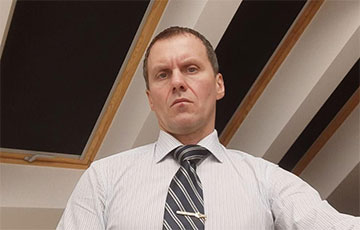
New materials on the dictator's crimes will be published very soon.
Ihar Makar, the officer who uncovered the wiretap of the KGB chief who was planning to assassinate Pavel Sharamet, has spoken in his interview to Novaya Gazeta correspondent Iryna Khalip about who he was handing the tape over to, who shot Aliaksandr Taraikouski in Minsk on August 10, the atmosphere in the security agencies, and why it is a crime to take the Almaz special forces unit out into the streets.
The recording of the conversation that occurred eight years ago, in which the then KGB Chairman Vadzim Zaitsau and two members of the KGB special unit Alfa were discussing the future murder of at least four Belarusian citizens abroad, was made public by a former member of another special unit, who is also currently living abroad. There is a kind of near-artistic completeness about it.
Ihar Makar is the former deputy commander of the Almaz special anti-terrorist unit of the Belarusian Interior Ministry, and now a representative of the Belarusian People's Tribunal civil initiative. He served in Almaz from 1998 to 2004. Then he resigned and joined Aliaksandr Kazulin's team during the presidential election of 2006. After those elections Aliaksandr Kazulin was arrested during the protest rally and returned home, like several hundred other Minskers. Except that Kazulin came home not after 15 days, but after two and a half years. Ihar Makar managed to go to Europe and ask for political asylum.
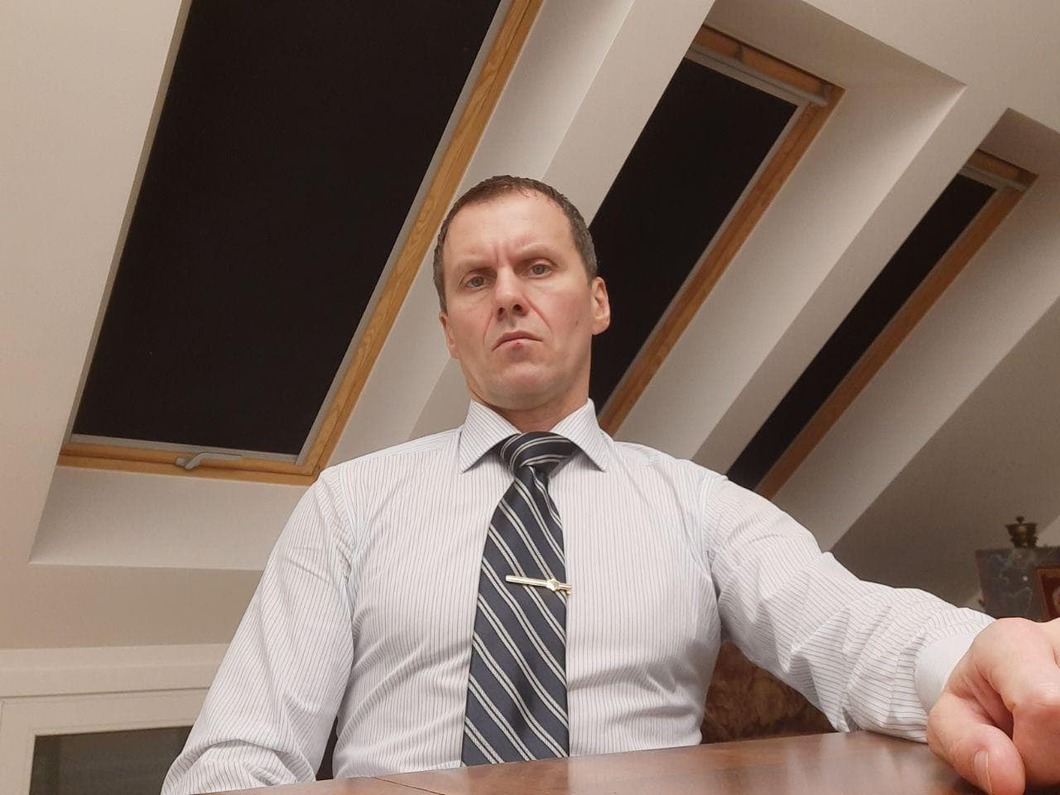
All the years Ihar spent in exile, he was in contact with many Belarusian law enforcers. One of them gave him the tape with Zaitsau's voice.
- Ihar, when did the recording of Vadzim Zaitsau's conversation with two Alfa officers come into your possession?
- I received the recording from my anonymous KGB sources when it was made - in 2012.
- Do you think you did the right thing by keeping it for eight years?
- I didn't keep it secret. When I was first listening to the tape, I heard there the name of my friend Aleh Alkayeu, the former head of the pre-trial detention center No. 1 in Minsk. We have a lot in common: we are both officers, we have both been granted political asylum at different times, we have common interests and goals. And I wanted to save his life in the first place, especially since my source told me that everything was very serious and would be implemented soon. So I passed the information on to American diplomats.
Later I learned that Aleh Alkayeu, who was living in Berlin, had received a call from the German Criminal Police and had been advised not to leave the country and even Berlin and offered protection. Aleh refused a personal security team, but there was directed surveillance. I don't know anything about the others mentioned in this recording, but Aleh told me that he had personally warned Pavel Sharamet. He did not know the contents of that recording, but since his life was in danger, he simply put that and that together - they were writing the book "The Firing Squad" - and suggested that Sharamet might also be in danger. Pavel was closely involved in the investigation of the explosion in the Minsk metro in 2011 and was in general a red flag to this dictatorial regime, so he was warned. Unfortunately, Pavel was killed after all.
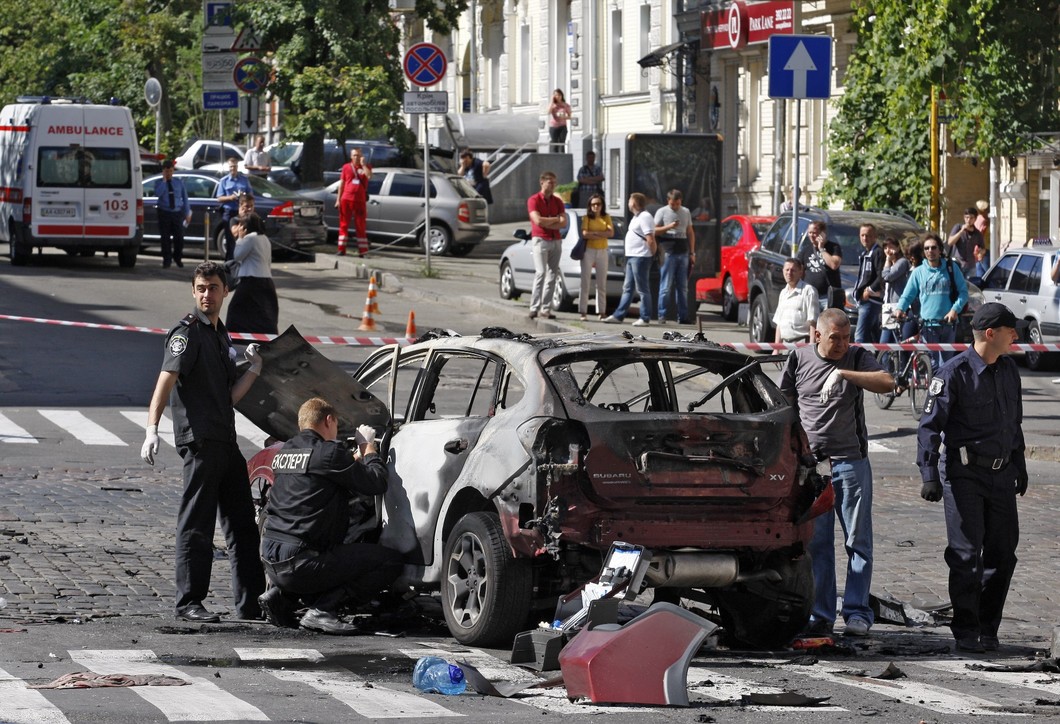
- Did you give the American diplomats only the information concerning your friend Aleh Alkayeu, or the whole record?
- I gave them all the information with all the names.
- If Alkayeu received a call from the criminal police, it means the information must have gone to all the other countries where those whose elimination was discussed in Zaitsau's office were staying. Why do you think the Ukrainian security services did not react back then?
- In 2012 Pavel was just about to move to Ukraine. But I know that the information was passed both to the Russian Federation and Ukraine, and even to the Belarusian Foreign Ministry. By the way, that's when Vadzim Zaitsau was dismissed from the position of the KGB chairman. He did his best to prove that he was utterly loyal to Lukashenka. He gave interviews in which he said that he would do anything for Lukashenka, in essence, he asked to be taken back. But the KGB didn't let him back.
- I know that you have been in touch with your former colleagues and in general with the law-enforcement officers from different departments. What changes do you think are taking place in security agencies now? I mean their attitude to Lukashenka.
- A very serious zombification is taking place. The riot police and special forces of the internal forces are regularly told that people go to rallies for Lithuanian and Polish money. This is done so that the security wing continues to support the regime and commit crimes against the people. However, when I talk to my former colleagues, I can say that at least 30% of the employees of the security wing - the Interior Ministry, the KGB, the internal troops - simply take it as it comes and try not to think about anything. If two employees may still touch on some political topics between them in conversations, then three of them may not. They are afraid. But it is precisely these 30% who will side with the people when they see that the balance of power has changed and that the regime has really faltered.
- And to what degree must the regime falter for them to side with the people? Something has to serve as a trigger, right?
- I won't hedge and wriggle, I'll tell it like it is. By now it's already safe to say this. Everybody knows very well that Lukashenka has become a real red flag in the society. Every mention of him enrages people. He has become toxic. And it is precisely the members of the law enforcement agencies who have not committed crimes or have committed minor crimes that are not registered anywhere - they are already contributing, even if unofficially, to the house of cards to fall. And those who have committed crimes will defend this regime to the end. They also understand that in the future free Belarus, there will be no OMON, Almaz or Alfa, and they will become outcasts. Even today it is better not to walk around the city in police uniform - it's a disgrace. And when the house finally falls down, everything will be investigated.
Every fact, every raising of the baton, will be analyzed in detail. Obviously, the criminalists and other services that have not been involved in the repression will be retained. And they will have a lot of work.
- You yourself served in Almaz at the turn of the century. At that time it was a really elite special unit. And now it is thrown to suppress protests and it is already known that the fatal shot at Aliaksandr Taraikouski near the Pushkinskaya metro station on August 10 was made by an Almaz fighter.
- On August 9-11, all the personnel of Almaz were working in Minsk. In general, Almaz is a unit that works as a team. They are not operatives who can act alone, Almaz operates as a group only. The video of Taraikouski's murder shows that any Almaz officer could have easily come up and detained him, or commanded him to "get down!" or "get down on your knees!" But no one did, because Almaz is trained that way - it's easier for them to shoot, which is what we saw.
Sending the Almaz to disperse a demonstration is like putting surgeons to assemble MAZs and MAZ workers - to the surgical table.
Both will indeed do the job if they are ordered to do it (and in the case of Almaz, there was an order), but the first ones will ruin the production, while the others will ruin human lives. The Almaz special unit, whose functional duties do not include such work, had no right to go out into the streets to disperse the protests. But the fighters were sent there, and as a result we saw a huge number of shots fired, we saw a huge number of wounded, we saw murder in front of people, we saw gas and stun grenades thrown in, which also cause very serious bodily injury. And Almaz will be held accountable for that.
- What are the restrictions on the use of special means? Surely the fighters are instructed on that?
- If you fire a rubber bullet or buckshot from a distance of 20-25 meters, it can end very sadly. There are safety measures: it is allowed to shoot rubber bullets from a distance of 50 meters and more. But in the video where Aliaksandr Taraikouski is killed, the distance between the Almaz fighter and Taraikouski himself is no more than 10 meters - and that with a margin. A man standing with his hands up in a T-shirt and without a bulletproof vest or even without a jacket is shot from 10 meters - that's the execution. According to the safety instructions, the shot should be fired into the soft tissues, so that there is no threat to life and health. You can't shoot in the head, in the heart, in the groin.
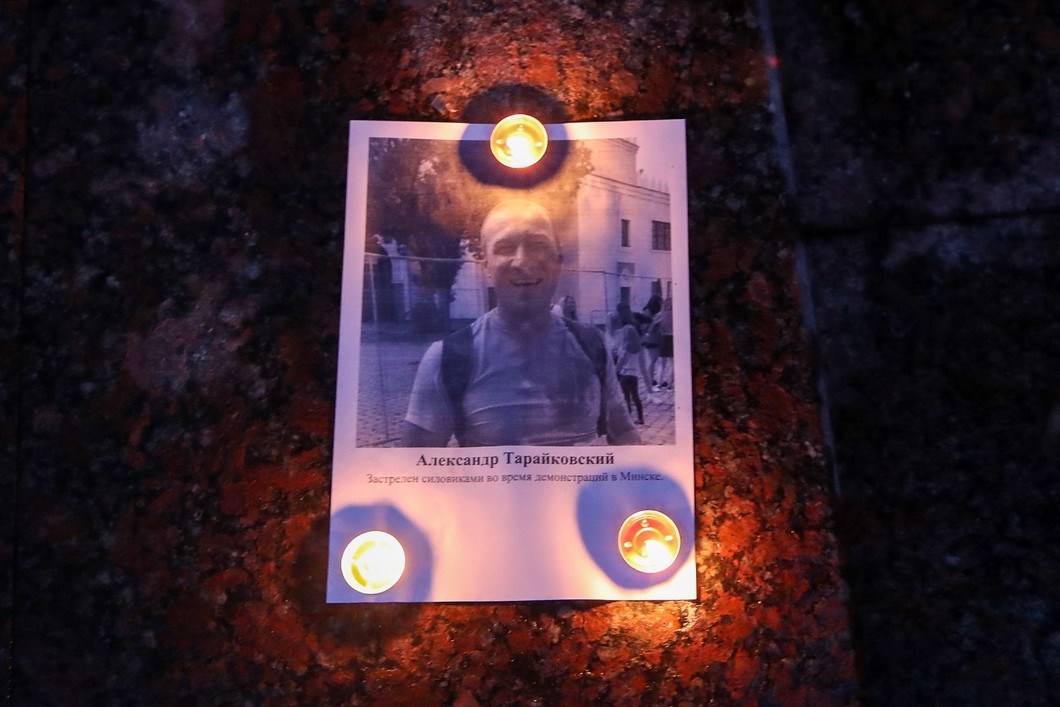
And the shot at Taraikouski was made in violation of all norms. There are the same instructions for rubber batons: you can't hit the hands, you can't hit the head. A stun grenade has a body made of aluminum, but the detonator is made of hard metal. And if you're anywhere near that grenade, the metal fragments can not only injure you, they can kill you. I can say that no one followed the safety instructions at the protests at all, or even tried to. This means Almaz employees went out safely to do such work, knowing that they would not incur any liability, as they had already done in 2006 and 2010. They thought it would be exactly the same in 2020. But it won't be anymore, and I believe they will be held accountable.
- So the fighter who shot Taraikouski from 10 meters was aware that he was killing him?
- You should understand that the fighters sleep with this weapon, they know it inside out, they shoot with it during training every day. So it would be wrong to say that he wasn't aware of it. Of course he knew it. But that means he was committing premeditated murder. And if there are people like that working at Almaz now, I have no comment.
- When did the Almaz start degenerating from an elite special unit into a gang of armed thugs?
- The Almaz today is a real organized criminal gang. I bear no grudge against the unit. I'm not going to humiliate the fighters and say that I'm good, because I left and sided with the people, and the unit, respectively, is bad.
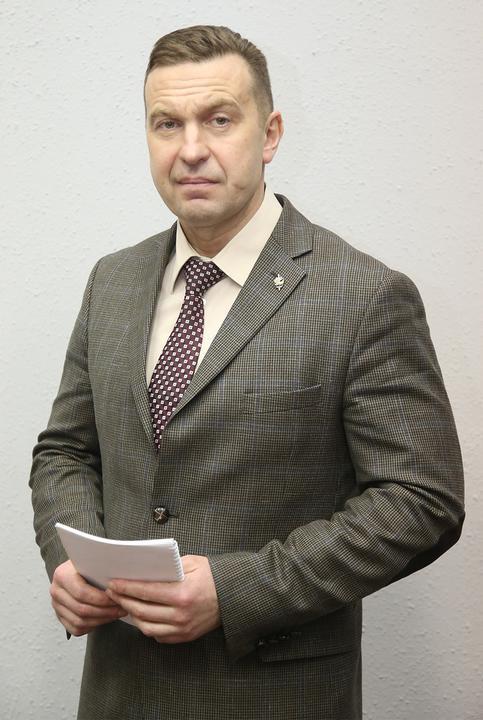
It's just because the unit has been involved in political actions since 2006 because of Lukashenka. In 2006, Mikalai Karpenkou was the Almaz commander. This man is loyal to Lukashenka and will carry out any orders. He has already been doing so - a lot of people were beaten and arrested back then, after the 2006 election. Almaz was involved, and no one was punished. Just like in 2010, just like in August 2020.
When I worked there, they once tried to use us for possible suppression of a protest, too. In 2001, there was a rally against Lukashenka in the city center, and we were sitting in three minibuses near his residence. Then the head of security came out and asked us to protect them. He said that the security service would do its job, of course, but they are not as professional as we are. "We really count on you, - he said. - Then we'll look into it, we'll give you apartments". Of course, no one spoke to us afterwards, nor did they give us any apartments. The people either left themselves, or were dispersed by the riot police. And we just went back to the base. And now I just can't imagine what we could have done with our weapons there in the square. Now Almaz obviously came out armed and with military weapons as well - I saw a Kalashnikov and a Glock - but for the most part the soldiers had pump action shotguns. And when I served, everyone had combat weapons. Personally, I had three kinds of weapons: Glock, MP-5, and Uzi. And if we'd been sent out to disperse the rally, what would we have done? Would have shot unarmed people with submachine guns? What luck that we were returned to the base!
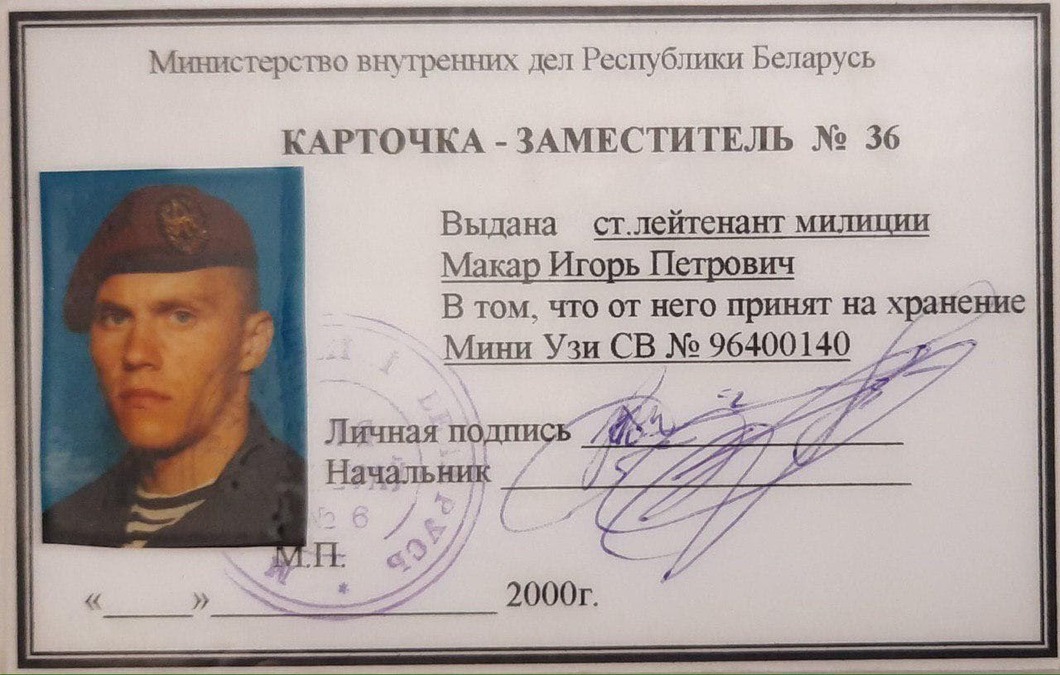
- Mikalai Karpenkou, who headed Almaz in 2003, as head of the State Department for Combating Organized Crime and Corruption was personally smashing windows in a cafe that let demonstrators in in the fall of 2020, then participated in the kidnapping and torturing of flower store owner Maksim Kharoshyn, and appeared on TV saying he was ready to use firearms to keep demonstrators off the streets. Lukashenka appreciated this diligence: he appointed Karpenkou Deputy Minister of Internal Affairs and Commander of the Interior Troops. You managed to work with him for about a year. Has this man always been like that, ready to go smash windows and torture people?
- I got acquainted with him even earlier: before Almaz, when Karpenkou was working for the presidential security service, I was training his group. They used to come to our base to train, and Karpenkou always asked me to train them. As for window-bashing, he needed it - so that the Department for Combating Organized Crime and Corruption was working in the streets in balaclavas, in civilian clothes, with flak jackets and batons. They were beating not only the glass, but also people, and very brutally.
- And why did Karpenkou want the Department for Combating Organized Crime and Corruption to be in the streets? They have completely different functions.
- When Karpenkou was Almaz's commander, the unit did carry out criminal orders. Then he was promoted and appointed to the Department for Combating Organized Crime and Corruption, where the same thing started to happen.
Those who served with him at different times have no doubt that the Department for Combating Organized Crime and Corruption was also involved in running protection and drugs. Believe me, it will all come out.
Nothing new happened with Karpenkou last fall: after the August elections, he manifested himself exactly the same way as after the elections of 2006 and 2010. And now he has reached his goal, the one he has been reaching for many years: he is a deputy minister and commander of the internal troops. And Lukashenka trusts him - he sees his loyalty.
- You now call yourself a representative of the Belarusian People's Tribunal. What is it and what are the objectives of this tribunal?
- The Belarusian People's Tribunal is a civil initiative. We do not just collect information, but evidence of the crimes that have been committed and are being committed by the regime. If we go back to where we started - the recording of the conversation about the planned murders of Belarusian citizens on the territory of other states - this is an act of state terrorism.
We have other evidence of the current regime's crimes. We are preparing materials for the world community and for the future trial. For when Belarus becomes a free country, all these materials will serve as the basis for many criminal cases. In addition, we are developing a program to help those who have been subjected to repression because of their participation in the protests.
- The recording that was mentioned at the beginning of our conversation was made public eight years after it came out. Are there other recordings you intend to make public?
- Sure, there are. And they will be made public very soon. Remember, in that recording, KGB Chairman Zaitsau says, "Should we deal out pinpoint blows"? Well, we will also be dealing out our pinpoint attacks upon Lukashenka's regime and his entourage.










